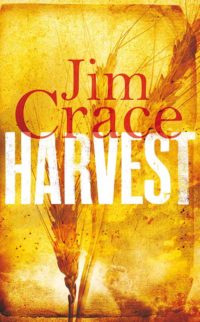There is a silent ripeness to the air
 Harvest
Harvest
by Jim Crace
This is an unusual book, primarily because of its historical setting and premise. While there are plenty of historical novels, there are few that remain so determinedly non-specific about the time and place in which they are set and even fewer where the action revolves around the forced enclosure of common land.
England (which is presumably the setting, though even that isn’t stated outright) had a series of Enclosure Acts from the 12th century to the 19th, but they became especially common in the 17th and 18th centuries. Effectively, this allowed landowners to seize common land – land that their tenants, which often meant whole villages, farmed for their own use – and enclose it, controlling what was farmed there. This might mean charging rent to local people or it might mean switching to a type of farming that employed far fewer people, such as sheep farming.
It doesn’t sound like the most auspicious basis for a book, but actually that part of it really worked for me. It felt very relevant to be reading about social injustice, the rich getting richer while the poor lose what little they have. There is some action too – arson, violence, death – which the landowner turns to his advantage, though the villagers don’t realise it.
The story is narrated by Walter Thirsk, but it takes a while for him to separate himself from the collective “we”, as he describes the whole village working together to gather the harvest. (The village, incidentally, is not only unnamed by Crace, but is known only as The Village to the peasants who live there.) We gradually learn that Thirsk is a semi-outsider, having moved here from a larger town or city 12 years earlier, when he was the manservant of Mr Kent, who came here to marry the woman who owned the land, and thence became Master Kent. Thirsk married a local woman and settled into the farming life. Both men have been widowed, but have stayed on and made this their home.
“There is a silent ripeness to the air, so mellow and sappy that we want to breathe it shallowly, to sip it richly like a cordial. No one who knows the busy, kindly, scented universe of crops and the unerring traces of its calendar could mistake this morning’s aromatic peace and quiet for anything but Gleaning Day.”
But now this idyll of pastoral beauty and rewarding hard work is threatened from two corners. First, a plume of smoke indicates that newcomers have staked a claim to their bit of village land by building a house before sunset. Thirsk and Kent were the last outsiders to arrive here and such, the newly arrived threesome are the immediate suspects when the dovecote is set on fire. While that situation goes from bad to much much worse, another stranger appears, but this one is a surveyor, Mr Earle, mapping the land in preparation for a switch to sheep farming.
Gradually, Thirsk separates further from the other characters – both by circumstance but also by his own mixed loyalties. He started out as Master Kent’s man, after all. His natural tendency is to observe, which doesn’t make him wholly sympathetic when he just stands back and watches injustice being done. But he does feel very real. Similarly, Mr Earle is a rounded combination of a skilled man who enjoys his work and a compassionate man aware that he is the precursor to potentially devastating change.
The writing is beautiful, with simple evocative descriptions of the land, of farming, of daily life that relies on human (and horse or mule) effort. The village is just far enough from the nearest big town that it is effectively outside of law or even church rule (there is land set aside for a church but it hasn’t been built yet). The children are discouraged from wandering beyond the village by having their heads bashed against the boundary stones – a violent but effective measure. This remoteness makes it even more of a shock for the villagers, a confusion really, when Master Kent announces the sheep farming plan, though the astute reader may have seen it coming.
“The acres seem to undulate and fall so endlessly and with such monotony of harvesting and tillage, such space and depth, that any bottom to them is not lost in the clouds or mist but in the duskiness of distance. What little pickings may be left are given over now to our cows and uninvited birds. Wild pigeons pause and jerk, full of fussy self-esteem and grain. I try to people it, but can only hear the weird and phantom bleats of sheep.”
The book’s only drawback for me was the narrative voice. Through word choice and narrative style, Crace has to some extent made this feel as if it was written hundreds of years ago. Which makes sense, but also had that stilted, slightly impersonal air of some of the drier “classics”. While I wouldn’t by any means call this novel dry, I did find it a slow read.
This book was chosen for my book group and we’re meeting to discuss it next week. It’ll be interesting to see what they all thought.
Published 2013 by Picador.
Source: Amnesty Bookshop.